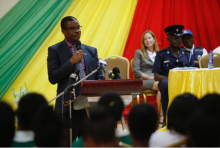Malaria vaccine pilot launched in Ghana
Health officials and community leaders gather to celebrate the landmark launch
WHO Ghana welcomed the Ministry of Health’s launch of the world’s first malaria vaccine in a landmark pilot programme. Top health officials, WHO representatives, community leaders, and mothers and children gathered on 30 April 2019 to officially begin the vaccine rollout. The country-led phased vaccine introduction is supported by WHO and national and global health partners.
Ghana is one of three African countries in which the vaccine, known as RTS,S, will be made available to children up to 2 years of age.
Malaria remains one of the world’s leading killers, claiming the life of one child every two minutes; most of these deaths are in Africa. In Ghana, about 20 percent of all children have malaria parasites in their blood.
“This is a day to celebrate,” said WHO Representative for Ghana Dr Owen Kaluwa. “This breakthrough in malaria control caps a 30-year effort to develop a vaccine with proven results to help prevent malaria in young children. The malaria vaccine has the potential to save tens of thousands of children’s lives.”
Dr Kaluwa congratulated the Ministry of Health of Ghana for its commitment to the RTS,S vaccine pilot and what it could mean to improve child health and malaria control.
A roster of distinguished speakers participated in the event, including the Director-General of the Ghana Health Service Dr Anthony Nsiah-Asare. Deputy Minister of Health the Honorable Alexander K. K. Abban gave keynote remarks and then officially announced the vaccine pilot underway.
Susana and Abigail, both age 6 months, were then vaccinated – the first children to receive the malaria vaccine in the Ghana pilot – in front of the attending audience of about 300 health workers, national immunization and malaria specialists and community supporters.
RTS,S is the first, and to date the only, vaccine that has demonstrated it can significantly reduce malaria in children. In clinical trials, the vaccine was found to prevent approximately 4 in 10 malaria cases, including 3 in 10 cases of life-threatening severe malaria.
“Malaria is one of the most devasting maladies in our history and we in Africa bear the brunt of its toll on the world,” said Dr Kaluwa. “Globally, and in Ghana, we have made significant gains to control malaria in the last 15 years, but progress has stalled and even reversed in some areas. We need new solutions as we continue our fight against malaria and this vaccine gives us a promising new tool.”
The pilot programme is designed to generate evidence and experience to inform WHO policy recommendations on the broader use of the RTS,S malaria vaccine. It will look at reductions in child deaths; vaccine uptake, including whether parents bring their children on time for the four required doses; and vaccine safety in the context of routine use.
The vaccine is a complementary malaria control tool – to be added to the core package of WHO-recommended measures for malaria prevention, including the routine use of insecticide-treated bed nets, indoor spraying with insecticides, and the timely use of malaria testing and treatment.
The vaccine pilot programme includes areas of Brong Ahafo, Central and Volta regions and some districts in Upper East region. Within these regions, some districts are receiving the vaccine, while others are expected to receive the vaccine at a later date. The remaining districts and regions are continuing to benefit from other malaria control measures implemented nationwide.
The WHO-coordinated pilot programme is a collaborative effort with ministries of health in Ghana, Kenya and Malawi and a range of in-country and international partners, including PATH, a non-profit organization, and GSK, the vaccine developer and manufacturer, which is donating up to 10 million vaccine doses for this pilot.
Financing for the pilot programme has been mobilized through an unprecedented collaboration among three key global health funding bodies: Gavi, the Vaccine Alliance; the Global Fund to Fight AIDS, Tuberculosis and Malaria; and Unitaid.





